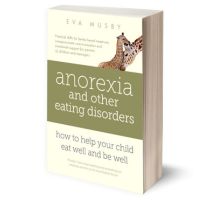Why am I listing the weirdest symptoms of an eating disorder?
When your child displays bizarre symptoms, you might want to know if these are normal for an eating disorder. Most often, they are. And otherwise, ask your eating-disorder specialists for more advice.
If something is 'normal' for an eating disorder — however weird and distressing — then eating disorder treatment is the correct treatment, and it's wise to concentrate on making that work.
My daughter had some of the really strange beliefs and behaviours listed below, and they passed as her eating disorder was treated. Most faded as she got regular nutrition and started regaining lost weight.
I am writing this page for you if you're asking yourself "Is this normal? Could there be something more complicated going on?" I don't want most parents to increase their stress by reading this page, because their child may never get any of the following difficulties. Keep your energy for prompt treatment. You don't need to know the more weird and distressing signs, most of which pass quickly anyway with eating disorder treatment.
Perhaps you googled symptoms and came across discussions of PANS or PANDAS. Before you wonder if these might fit your child, see below how many of the symptoms are 'just' normal effects of an eating disorder.
The bizarre presentations of an eating disorder
I'm going to list the more unusual beliefs and behaviours you might see in anorexia nervosa, atypical anorexia nervosa, or ARFID. The more usual ones, for all eating disorders, are here on my website — they're also in the diagnostic manuals and the websites of eating disorder organisations.
But let's move on to the ones you don't hear about that often, even though they are not that unusual. I've talked to many parents and clinicians who nod in recognition when they're mentioned.
"Water will make me fat!"
For instance, here is a 10-year old, in malnutrition, awaiting eating disorder treatment. She is super-anxious about anyone touching her food (partly a heightened anxiety about hygiene, partly because fingers might add some fat). She resists having a shower, drinking fluids, and even swallowing her own saliva as she believes these will make her fat. She has moments of distress and aggression where she is sure her mother is not her mother. Sitting – especially during car journeys – is agony: she hovers over the seat. As with most youngsters with anorexia, these bizarre and distressing symptoms subside with nourishment and weight gain.

Signs that are common in eating disorders
- you don't recognise your child any more — their personality changes drastically
- anxiety, distress or panic attacks
- emotional lability (big swings in mood)
- depression, self-harm, suicidality
- irritability, aggression, personality change, oppositional defiance
- picky eating, rituals around food, fiddling with the food
- a need to gag, to spit out food
- tics
- exercise/movement compulsion
- fidgety, cannot stay still, constant movement (not necessarily in order to burn calories)
- an irresistible compulsion to tense muscles (they might only sit on edge of seat, on tiptoes)
- frequent body-checking (in mirrors, or by feel) and of course, body dysmorphia
- ADHD-like symptoms (Attention Deficit and Hyperactivity Disorder) – and indeed there is some overlap between eating disorders and ADHD
- OCD-like symptoms (Obsessive-Compulsive Disorder) – and indeed there is a major overlap between eating disorders and OCD
- a need for lists, planning, for everything to be tidy and in order, for rituals (and other behaviours commonly found in OCD or in Autism Spectrum Condition)
- anxieties around hygiene, such as repeated handwashing
- have a strong internal voice (internal critic); less often, this is actually perceived as a voice they can hear
- very low self-esteem, self-hate, certain that everyone hates them
- the certainty they are right and everyone else is wrong
- no sense that there is anything wrong with them
- behavioral or developmental regression (behaving like a much younger child), or separation anxiety (scared of going to school, clinging to a parent, the home, or won't leave their bedroom)
- repeated questions, obsessive requests for information or for reassurance
- recurrence, relapses (relapses are common — though many never relapse — especially if stages of treatment were omitted)
Katie Maki, describes here behaviours in her then 10-year old daughter with anorexia. Below I copy just a few of them (they all went away with anorexia treatment):
-Auditory hallucinations (they “hear” the eating disorder’s voice as separate from themselves
-Visual hallucinations. My kid called it “ the blackness”. She would scream at me "Why can’t you see the blackness? It is right there!"
-Talk of death. My kid insisted I know which dress to bury her in. She kept saying that the eating disorder told her the only way she’d ever be rid of it is if she was dead. She did not self harm, but that is also common
– OCD ritualistic behaviors surrounding movement, counting, etc. (e.g. my kid had to run around the van a certain amount of times and then jump into the van with both feet until it “ felt right” and then squat in the seat. She had a zillion of these behaviors.)
-Violent outbursts (my kid hit her head on windows, punched her dad in the jaw, spat in my face etc. and frankly she was mild compared to many).
And QUITE common in ordinary eating disorders too
- fear of swallowing their own saliva because of a belief it makes you fat
- fear of breathing in calories when they smell food
- a belief that the food or drink is contaminated (hygiene concerns of an OCD nature)
- a belief that the food or drink has extra calories (because you touched it or breathed on it)
- avoiding drinking or washing because of a belief that water makes you fat (they may also avoid washing because it's too horrific to see their body)
- a fear of vomiting (emetophobia)
- deterioration in school performance, inattentive, distractible, unable to focus, increase in hyperactivity, difficulties with memory and concentration, brain fog, regression to baby talk
- the opposite is true too: your child may shine in school (though at home they may be unable to focus on a game, a movie, a book)
- sensory abnormalities such as becoming super-sensitive to certain tastes or textures in food, or a sensitivity to smells, sounds, clothes, temperatures or light. And yes, you’ve guessed it, autism and eating disorders have a big overlap.
- sleep disturbances (restless, nightmares)
- speech can be affected: stuttering, mutism (selective or not)
- delusions e.g. 'everyone is talking about me', 'you are not my mother'
- onset may be in early childhood (ARFID is often detected at toddler stage, and plenty of boys and girls age 8+ are diagnosed with anorexia or atypical anorexia)
Making it simple
Eating disorders have a big overlap with anxiety, depression, OCD, autism and ADHD. Some of the more bizarre symptoms are linked to malnutrition, and they pass quickly. Others take time and repetition to fade out. Either way, the overwhelming recommendation is early intervention, and focusing on solid, evidence-based eating-disorder treatment.
If your child is displaying symptoms I've not listed here, perhaps that's my omission, or perhaps your child has another issue — most likely co-occuring with the eating disorder. With these 'comorbids' the general advice is to treat the eating disorder first as it's the most dangerous and urgent. Either way, you need clinicians specialised in eating disorders to advise and guide you.
Onwards
* My Bitesize audio collection *
* How to calm your child when the eating disorder heightens anxiety and panic *
* How do you get your child to eat? *
* When OCD shows up alongside your child’s eating disorder *
* Autism and eating disorders: individualising treatment for your autistic child or teen *






LEAVE A COMMENT (parents, use a nickname)